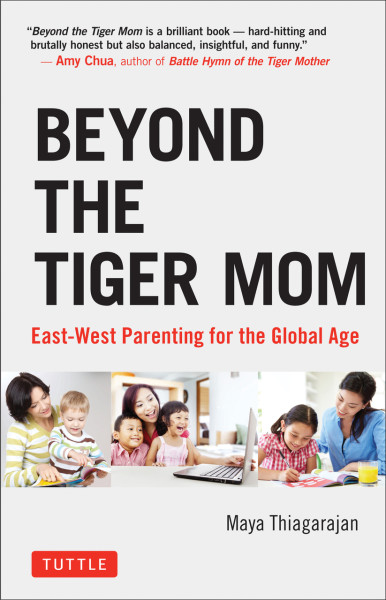I’ve always seen myself as a Tiger dad. I know saying that has a lot of negative connotations. But I have big dreams for my toddler. First, he’s going to get into Harvard, then either make the NBA or play Major League Baseball, whichever pays him more. After a hall of fame career, he’ll transition into politics where he’ll be the first Asian American president.
That’s why when the book “Beyond the Tiger Mom” by Maya Thiagarajan was up for review, I jumped at the chance. I figured it’d be good for me to learn some tricks to help my toddler to do all that I have planned for him.
“Beyond the Tiger Mom” compares Eastern and Western approaches to parenting, education, and family values. It wasn’t surprising that the East values math, while the West values reading. The East is all about memorization, exams, tutors, and all things that involve working hard—even to the point of having little to no free time. And how the West is the complete opposite—pushing independence and critical thinking . The author sums up the difference in this very insightful paragraph:
“Over my years of working both in the West and in the East, I’ve come to see one major cultural difference between Eastern and Western cultures that permeates education systems and child-rearing philosophies. With their emphasis on filial piety, family loyalty, respect for elders, ad veneration of education and knowledge, Eastern cultures tend to encourage children to be reverent. Children are raised to be obedient and to treat family and education as sacred. In contract, with their emphasis on questioning existing knowledge and exploring the unknown, Western cultures tend to encourage a culture of skepticism. Children are raised to ask questions, to challenge norms, and to be skeptical of existing knowledge, institutions and authority figures.”
What was most surprising to me as I read this book was that it reminded me how American I am. Being an ethnic minority in America it sometimes feels like I have one foot in America and the other in the country of my ancestors. But this book reminded me how false a belief this is. The better analogy would be that the tips of my right toes are in Asia but that the rest of my feet are in America.
Likewise, it showed me how un-Asian (if that is even a word) I am in the way I am raising my child. Even something I took as universal—reading to your child before bed—is more Western than Eastern. I want my child to question and be skeptical of anything too dogmatic. I don’t require respect for elders (since I don’t believe all elders deserve respect), I do require politeness though. I don’t want him to grow up and be loyal to me and my wife just because we are his biological parents. I don’t want his blind respect. I want to earn it from him for being a good dad, a good husband, and an overall good person.
“Beyond the Tiger Mom” severed as a good reminder then to help me keep a broader perspective on child-rearing and teaching philosophy. That things I took for granted as universal parenting laws—like reading to your kid—isn’t really as universal as I thought. This doesn’t mean that I’m not going to read regularly to my child—I am, I’m a writer after all—but it reminded me that math—Kumon here we come!—and hard work are equally important keys to success.
What I enjoyed most about Thiagarajan’s book was that it gave good perspective on the whole East Vs. West debate and what is really at stake:
“Most parents in the East and the West-in every corner of the world—want the same long-term outcomes for their children. We all feel a deep desire to ensure that our children are healthy and happy, and all want them to be kind and compassionate to others, to be good people who act with integrity to make the world they live in a better, more humane place.”
So in the end, even if my son doesn’t make the NBA or MLB, the White House, or Harvard, I’ll still love him. But I need to remember that the most important thing I can do as a father is to help him become a kind, compassionate man with integrity who actively tries to make the world a better place.
Follow me on Twitter at @ksakai1









